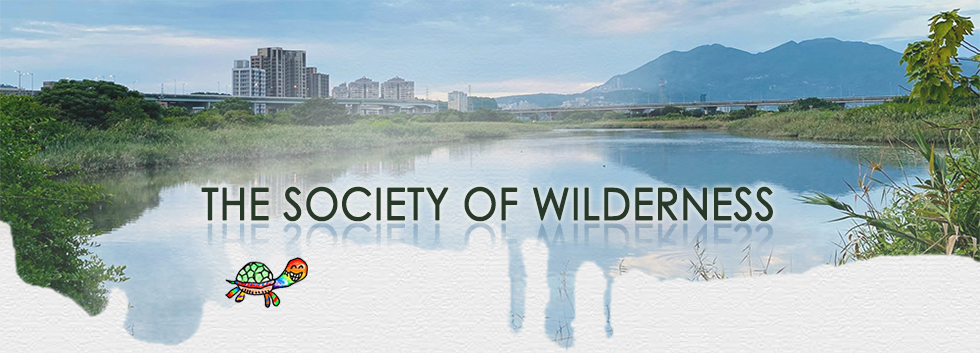Organized by I-Chia
SOW Introduction
(A) Get to know SOW
In recent years, human beings have over-exploited nature in order to obtain natural resources, increase industrial production and promote infrastructure development. This has caused destruction of biological habitats and a decline in the diversity of species. For example, the Wugu Wetland is gradually disappearing caused by the dispositions of spoil and waste water from the construction of Erchong Floodway. Another example, the rivers are polluted by the cements used to build embankments to limit the river’s waterway width. These man-made destructions have resulted in species to migrate or become extinct, causing unprecedented catastrophe to the environment.
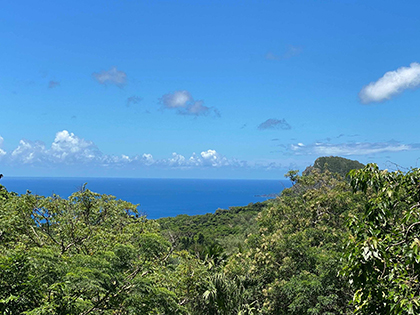
Source: Wilderness Crossing
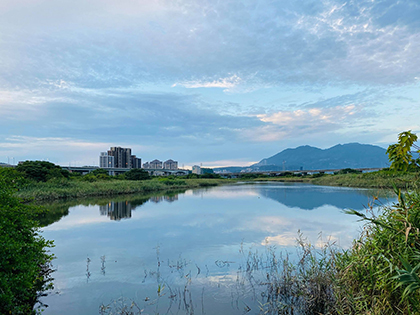
Source: Wilderness Crossing
Realizing the threat of human destruction to the environment, a group of pioneers led by Mr. Xu, Ren-Xiu and Mr. Lee, Wei-Wen took initiative to form an environmental protection organization dedicated to the protection and education of habitats and natural environment. They hoped to guide and lead the general public to appreciate the beauty of the ecological environment, and provide education to gain knowledge and understand the catastrophic threats to the environment. They aimed to replace protest with education and exchange government subsidies with volunteer services. Based on these principles, the Society of Wilderness was established in 1995.
Over the past 25 years, the Society of Wilderness (SOW) has committed to environmental protection, promoting education, and emphasizing love to Taiwan through proper actions. SOW is headquartered in Taipei and has 11 branches, 9 liaison offices, and 1 preparatory office in Taiwan, as well as 5 overseas partners. With over 20,000 members, SOW continues to utilize public participation in protecting the environment. The development of SOW can be categorized into four key stages:
Period |
Important Achievement |
|
| Initial Stage | 1994/4/8
| 1995/1/22 |
|
| Preparation Stage | 1995/1/22
| 1995/6/25 |
|
| Start-up Stage | 1995/6/25 | 1995/9/1 |
|
| Organization Stage | 1995/9/1 | 1996/1/27 |
|
The Society of Wilderness promotes concepts of ecological conservation through public participation, in-person contact with nature, and education. SOW aims to create an environment that can provide ecological education to the general public. SOW members adopt a gentle and good firm attitude toward environmental issues. By being personally involved in such issues, the members are able to develop SOW’s vision into on-going social activities.
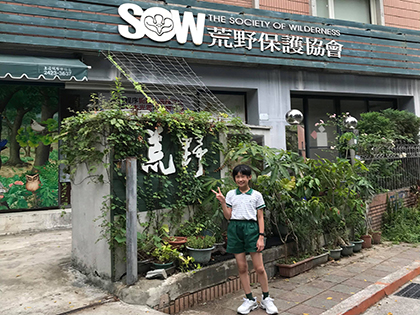
Source: Wilderness Crossing
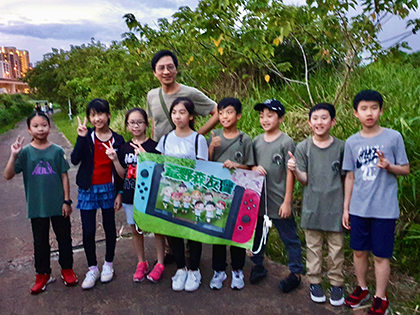
Source: Wilderness Crossing
(B) Wilderness Action
The primary goal of Wilderness Action is to protect the habitats of all species, not just limited to the environment human beings are living in. Thus, habitat protection includes establishment of eco-city, water and forest resource sustainability, restoration and preservation of wetlands, and achievement of plastic-free oceans. Despite strong wills and efforts, relying on just volunteers alone cannot effectively deal with environmental issues. It is necessary to raise social awareness to attract more public and corporate attention and further influence the government policy to reach the goal of environmental protection.
Habitat Work
SOW obtains management right to wastelands through purchase, long term lease, management contract, and donation. In addition to monitoring, maintenance, construction, and management, the protection tasks also include many research projects. These cannot be done by SOW and partners alone. It is necessary to collaborate with various interest parties such as other environmental groups, corporations, media, and government to ensure the habitat protection projects can be carried out without interruption.
SOW Habitat Project Results |
|
| Category |
Achievements |
| Purchase & Protect |
|
| Adopt & Maintain |
|
| Contract & Manage |
|
| Lease and Preserve |
|
| Research Project |
|
| Other Activities |
|
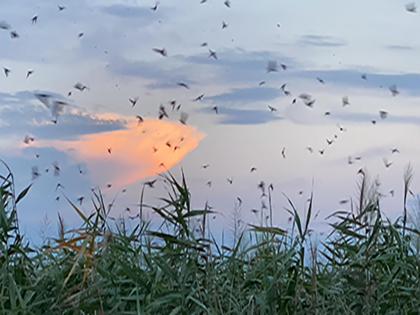
Source: Wilderness Crossing
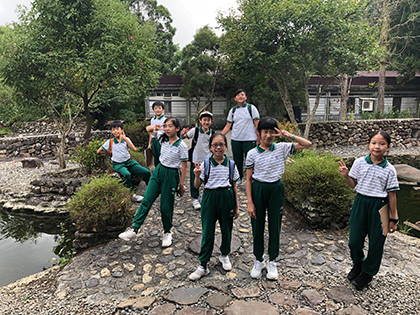
Source: Wilderness Crossing
Addressing Environmental Issues
SOW hopes to influence public behaviors through conceptual change, and further increase environmental awareness via collective actions from the general public and prevent inappropriate development or government policies. In the process, SOW has often encountered pressure from corporations, lack of government support, and ignorance from the general public. SOW prefers to protest with a more gentle and softer approach, rather than through more intense or violent actions. It aims to raise public awareness on conserving the environment through addressing important environmental issues.
Key Environmental Issues in Taiwan |
||
| Category | Environmental Issues |
|
| Wetlands & Coast Conservation | Taoyuan Algal Reefs |
|
| Taitung Zhiben Wetlands |
|
|
| Yilan Maoao Harbor |
|
|
| Hualien Coastline |
|
|
| Hualien Xikou Wetlands |
|
|
| Rivers & Forests | Water Resource |
|
| River Regulation |
|
|
| Mountain Forest Development |
|
|
| Urban Greenbelt | Eco-Park |
|
| Air Pollution |
|
|
| Sewerage |
|
|
| *Soil and Water Conservation Bureau | ||
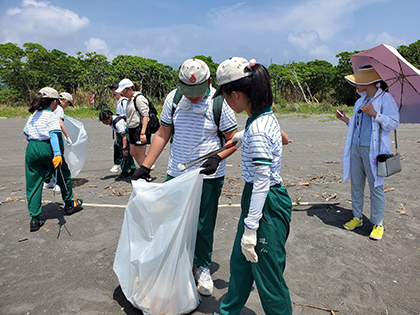
Source: Wilderness Crossing
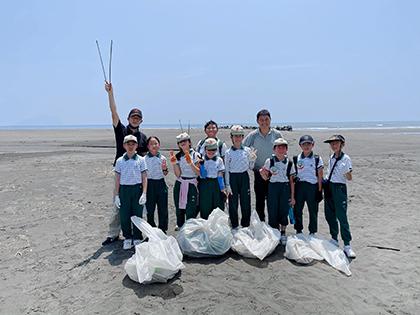
Source: Wilderness Crossing
Environmental Education
In recent years, there is increasing awareness of environmental issues. Environmental protection has become a universal value. However, when environmental issues conflict with personal interests and economic growth, most people choose to remain selfish and become less willing to make an effort toward protecting the environment.
SOW has professional and active volunteers who can fill the gap between awareness and actual action. Education is the crucial factor for SOW to achieve its vision and goals. There are 11 sub-branches throughout Taiwan to provide a variety of education including periodic seminars, volunteer training, advanced and training / learning courses, and outdoor experiment & activities. In addition, in order to reach out to more people and attract more participants, SOW also has specially designed courses and activities for children and families.
Activities |
|
| Wilderness Family | |
| Promotion of Environmental Education for Children | Planet Earth Initiatives (Earth Day Earth Hour, Get Out Your Night Goggles, Get to Know Climate Change, Expel Alien Species, Habitat Research), Ocean Initiatives, Earth Film Festival, Beach Cleanup, etc. |
| Environmental Actions | River Research, Coastline Tour, Field Study, Environmental Forums & Seminars, Speech Promotion, Weekly & Monthly Seminars, Introduction to Film Festival, Eco-Awareness Promotion, Campus Tours, Volunteer Training, etc. |
| Advanced Courses | Intro to Volunteering, Tour Guides, Commentators, Promotional Lecturer, Child Education Specialist, Beach Cleanup Leader, Marine Waste Investigator, Climate Change, Energy Conservation Promotion, Editing & Interview, Habitat Preservation, Eco-Mindset, Wetland Care, Ocean Volunteer, Special Education, Empowerment, etc. |
| Training / Learning Courses | Nature Observation, Nature and Humanities, Ecology, Woodwork, Filming, Drawing, Indigo Dyeing, Table Games, Green Map, Energy Conservation Workshop, etc. |
| Experiment & Activities | Stationary Observation, Nature Experiment, Unique Nature Experiment, Habitat Project, Working Holiday |
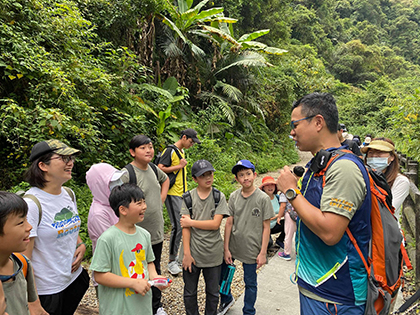
Source: Wilderness Crossing
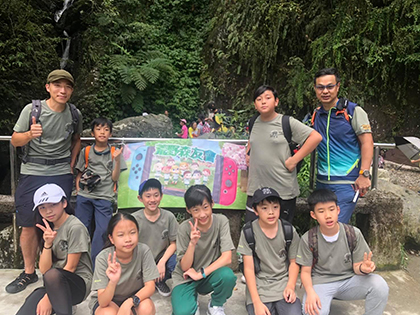
Source: Wilderness Crossing
Looking at SOW’s missions, its purpose is to achieve the goal of habitat conservation through taking root, protection, and management. The best learning course is to bring people into nature to see and feel the environment closely. SOW uses environmental education through tour guides and on-site participation with an aim to introduce the right concepts, correct human behaviors, and protect valuable habitats, allowing future generations to share the environment with all other species. Non-governmental organizations such as SOW play an important role in environmental protection for trying to achieve the goal of sustainability.
| Direction | Goal | Examples |
| Take Root | Changing concept and behavior through education |
|
| Protect | Avoid improper development that may lead to irreversible destruction |
|
| Manage | Management of nature sites by NGOs and volunteers |
|
- http://sow.tw/about/new%20people.htm
- http://sow.tw/about/method.htm
- https://www.sow.org.tw/about/41597
- https://www.youtube.com/watch?v=2Qt5tJAyoyk
- https://www.sow.org.tw/sites/sow/files/2019cheng_guo_bao_gao_-yi_ya_suo_.pdf
- https://www.sow.org.tw/what-we-do

